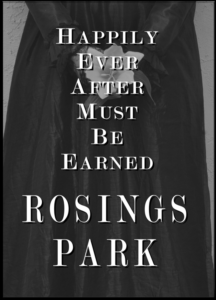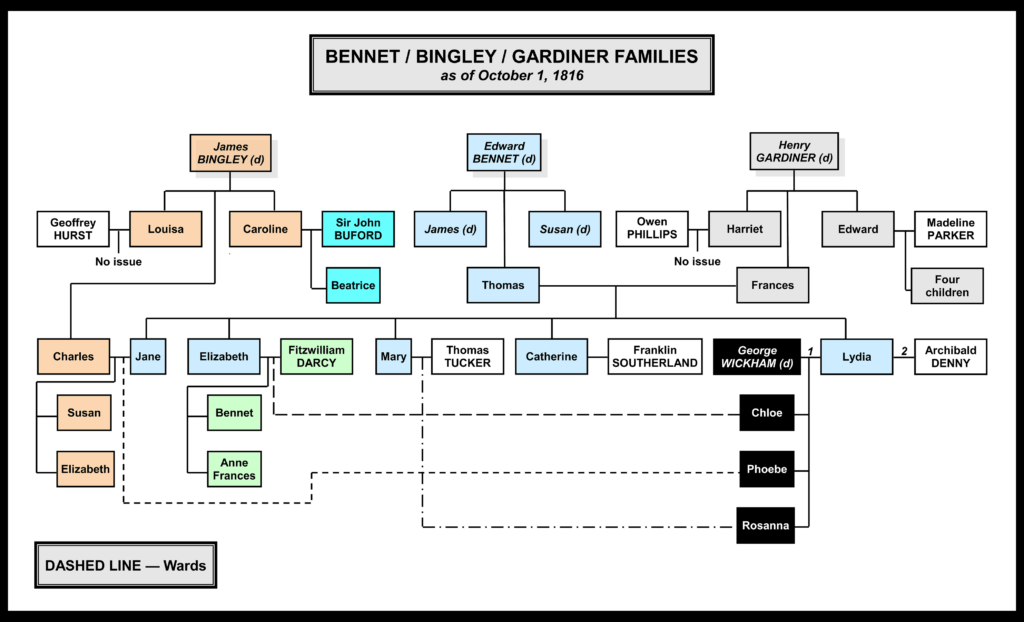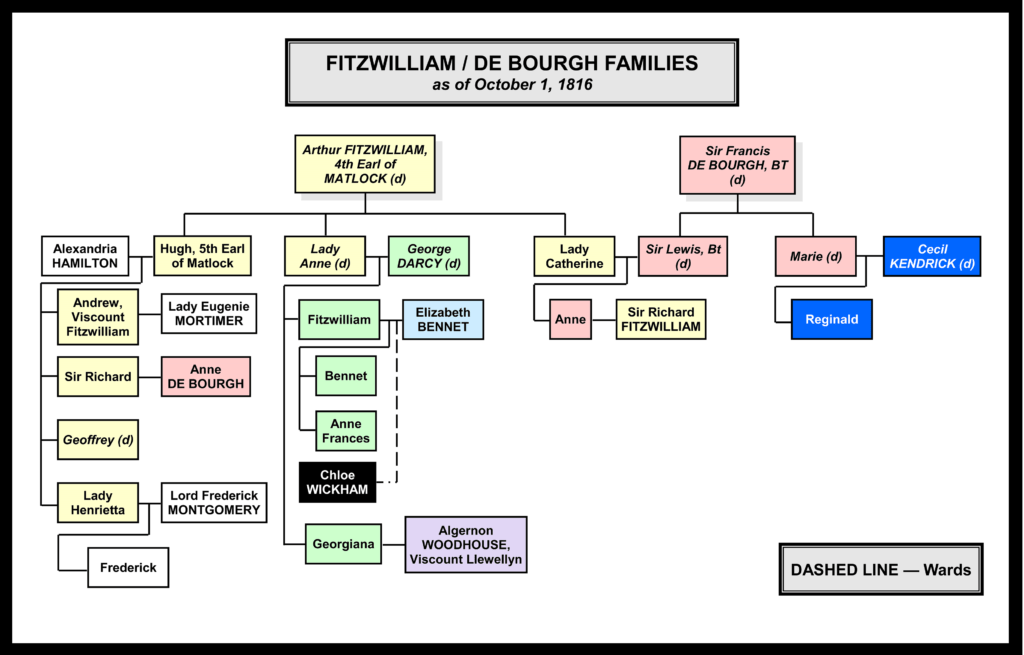 Rosings Park preview #1, by Jack Caldwell
Rosings Park preview #1, by Jack Caldwell
Greetings, everyone. Jack Caldwell here.
Finally, after over a decade of promises, I have completed my follow-up to THE THREE COLONELS: Jane Austen’s Fighting Men. After much deliberation, I have entitled it ROSINGS PARK: A Story of Jane Austen’s Fighting Men.
Just kidding. The first thing I came up with was the title. I fibbed. Sue me.
This is the big one, ladies and gentlemen. ROSINGS PARK is more than the sequel to THE THREE COLONELS (which is a sequel to Pride and Prejudice and Sense and Sensibility). It is also the concluding chapter of my epic Jane Austen’s Fighting Men Series. As a reminder, the other books in the series are THE LAST ADVENTURE OF THE SCARLET PIMPERNEL and PERSUADED TO SAIL.
So let’s get right to it, eh? As you can tell from the image above, this book is a bit … darker than the other novels. This idea is reinforced by the teaser video below:
Here is the back-cover blurb:
A decade ago, groundbreaking novel THE THREE COLONELS began the epic Jane Austen’s Fighting Men series and transformed Austenesque literature with its blend of Regency romance and historical fiction.
ROSINGS PARK is its long-awaited conclusion!
The Napoleonic Wars are finally over, and Britain seeks to rebuild after a generation of war. Gone is the “green and pleasant land” of the early Regency. In its place, a natural disaster on the other side of the world exacerbates the country’s woes: economic depression, widespread hunger, industrialization, and civil unrest. Great Britain faces ruin and revolution.
Fitzwilliam and Elizabeth Darcy agree to take in the young and spirited daughter of Lydia Wickham, and all the while, their beloved Pemberley is being endangered by riotous Luddites.
Colonel Sir Richard Fitzwilliam marries Anne de Bourgh but finds the management of Rosings Park no easy matter, especially with Lady Catherine de Bourgh ready and eager to offer advice.
Haunted by despair and gravely wounded in body and spirit, a bitter Colonel Sir John Buford returns to England to be nursed by his wife, the former Caroline Bingley.
Then, an evil out of the past returns to wreak vengeance on Rosings Park, and the Darcys, Fitzwilliams, Bufords, and their friends face a devastating truth:
HAPPILY EVER AFTER MUST BE EARNED.
Let’s add in a few family trees, shall we?
Hmm, lots of clues there, don’t you think? Questions, too. Having fun yet?
Now, the Prologue:
1788, Hunsford, Kent
That the magistrate’s men came after dark was no surprise, given the methods the Johnson family employed to put bread on their table. What was surprising was that the men chose to break down the door.
One moment, the Johnsons were consuming their meager soup in the dark main room of their rented cottage. The next, Mr. Johnson, beaten and bloody, was pinned to the wall by three brutes, and Mrs. Johnson’s arms were firmly held in the grasp of a fourth. The screams and curses had awakened their son, and the boy added his cries to the din. Two other men were in the small room, and while the constable ordered that the house be searched, the other man, the steward of Rosings Park, loudly demanded that the sobbing brat be quiet. Mrs. Johnson screamed as the steward raised his hand to strike the child.
“Here,” drawled an aristocratic voice, “none of that, Perkins.”
The already crowded space was filled by the newcomer, though not by his physical presence. Indeed, the man was of middling height and very slim. He wore a coat of gold over ivory breeches, a powdered wig under his black tricorne hat, and held a tall, ebony-painted, walnut walking stick adorned with a brass knob in his left hand. It was not his voice, nasal and high-pitched. No, it was the authority the man exuded that lit the dank scene like a lantern in a coal mine.
“Is this the man, Perkins?” asked the gentleman—for dressed as he was, the newcomer could only have been one.
“It is, Sir Lewis,” the steward assured him. “This is the thief.”
“And have you found what he stole?”
“Aye, master,” cried the constable, holding aloft the pilfered treasure.
“Hmm,” the master of Rosings Park and magistrate for Hunsford mumbled as he inspected his property. He then walked over to the prisoner, stopping only a foot away. He studied the injured man as one might a troublesome insect. Finally, he spoke.
“You stole from me, Johnson.”
The man had to spit out a bloody tooth before answering. “I don’t know nothin’ ’bout that—” His protests were interrupted by a slap on the face.
“Stop your damned lies!” the constable demanded. “We have the seeds right here!”
“I tell ya, I don’t know nothin’ ’bout no seeds,” Johnson insisted.
Mr. Perkins then spoke. “Things have been disappearing for years, Johnson, and I’ve had my eye on you. Now here’s the proof. It’s the noose for you.”
That got through Johnson’s bravado. “Hangin’ just fer seeds?”
“Those are not just seeds,” the gentleman said in a cold, dangerous voice. “Those are the future of Rosings Park. How can we have spring planting without seeds? How can we have wheat without seeds? You might as well have taken the money right out of my pocket.
“But hanging may be too severe. Confess, and I shall be merciful. Where is the rest of it?”
Johnson just stared at the gentleman. A violent shake from one of his captors loosened his tongue. “Buried it in th’ woods,” he admitted in a mumble.
“I wager there’s more besides, Sir Lewis,” said the steward.
The gentleman nodded in a satisfactory manner. “You will lead my men to the cache. Should all be recovered, I shall recommend transportation to the court.” To the constable he said, “Take him away.”
“Transportation? Ya might as well kill me!” Johnson screamed as the brutes dragged him out the door. The gentleman seemed to pay him no mind, occupied as he was by glancing about the small, rundown cottage.
“Sir Lewis, what about them?” asked the steward.
Sir Lewis turned to Mrs. Johnson. “You, too, benefited from your…husband?” At her nod, he continued. “You benefited from your husband’s crimes. You are as guilty as he.”
Mrs. Johnson said nothing. Not only did she know any protest would fall on deaf ears, the bloody rich bastard was right. She knew full well what sort of man Johnson was when she married him. He was just like her father—crooked and careless—big promises of an easy life that never came true. She was the daughter of a thief and the wife of a thief. It was the only life she knew.
“Should we take her in hand?” asked Mr. Perkins.
Sir Lewis shifted his gaze to the young boy, his cries reduced to sniffling. He looked at the lad with an unreadable expression. “Your child?”
Mrs. Johnson nodded.
“He is about the same age as my daughter,” Sir Lewis mused. “A boy. You are fortunate.”
Mrs. Johnson shrugged. It was neither good nor bad. He was her son.
The gentleman sighed. “Perhaps my next child will be a son.” He turned his attention to Mrs. Johnson. “Do you have some honest way to earn your bread?”
Mrs. Johnson spoke for the first time. “I’m a fair seamstress, Sir Lewis.”
“Hmm.” The gentleman stroked his chin. “You cannot remain here. This is a cottage for a working family.” He turned to the steward. “Have we a cottage available on the estate? One that is out of the way?”
Mr. Perkins scratched his head. “There’s an old blacksmith’s shack on the other side of the woods, but it’s in poor shape.”
“Yes, that will do.” The gentleman turned again to Mrs. Johnson. “Normally, you would share your husband’s fate, but I am a Christian man, and I shall offer you a choice. You can accompany Johnson into exile, or you can move to new quarters on Rosings. You will receive no other charity from me, save what the church decides to do, and you must earn your way in the world with your needle and thread.”
Mrs. Johnson eyed him suspiciously. “An’ what else?”
Sir Lewis sneered. “Do not flatter yourself, woman, that I would ever soil my hands on you. You must rebuild your reputation by honest effort, or you may go with your husband. I have stated my offer. What is your choice?”
There was no choice as there was no love between Mrs. Johnson and her husband. He was simply there to provide what little he could to the table, and in turn, she shared his bed. She would not risk her life for him. Many died on the voyage to exile. She would be lonely in Hunsford, but so be it. “I’ll stay.”
“Very well. Perkins, see that her belongings are packed and moved to the shack as soon as may be. Make any repairs to the roof as needed.” He turned again to Mrs. Johnson. “You owe my benevolence to your son. Treat him well.” The baronet walked over and ruffled the frightened child’s hair. “Let it not be said that Sir Lewis de Bourgh is not a generous man.”
Obviously pleased with himself, the gentleman left and never saw the look of hate on the face of Mrs. Johnson.
~~~
April 1815, Sumbawa, Dutch East Indies
For centuries in the southern Pacific Ocean, a fourteen thousand-foot mountain stood sentinel on the Indonesian island of Sumbawa. The island was highly productive agriculturally; honey, horses, and sandalwood flourished due to its fertile soil. Dutch invaders a hundred years before introduced coffee to the mountain’s western slopes. There was food for the people and for trade with others far away.
As in all things, abundance came with a price. The people who lived on Sumbawa had no idea their bounty was derived from ancient volcanic ash. The mountain, named Tambora, was actually an awakening volcano—a volcano that would change the world.
The eruptions began in early April and grew in intensity over a week. Those who could flee tried, but there was no place to go, no place to hide. On April 10, time ran out. The sound of the final explosions—the largest eruption seen in recorded history—was heard sixteen hundred miles away. A third of the mountain—five thousand feet—utterly disappeared. The volcano ejected thirty-eight cubic miles of pyroclastic igneous rock into the stratosphere. Tsunamis as high as thirty feet raced around the seas. Two centuries later, scientists would rate the blast at eight hundred megatons.
Twelve thousand people immediately perished.
All the ash and debris pumped into the sky by Tambora would take years to fall back to earth. Sunlight was blocked around the world, particularly in the Northern Hemisphere. There would be years without summer and with abnormally cold growing seasons. That meant there would be small or no harvests in Europe and America.
The dying had just begun.
Stop on by next Monday for Chapter 1. See you then!
Until next time, this has been the Cajun Cheesehead Chronicles.
It takes a real man to write historical romance, so let me tell you a story…



20 comments
3 pings
Skip to comment form
Definitely intriguing. I, of course, look forward to more.
Author
Thanks! Just tune in next week!
Well worth the wait! I just need to to read ‘Persuaded to Sail’ before reading this one! Very dramatic teaser music. Very fitting indeed! Thanks for the family tree too! Congratulations, Jack!
Author
You’ll enjoy PERSUADED TO SAIL, and ROSINGS PARK does wrap up the plot of PTS nicely.
I’ve been around since you began talking/hinting about this book, but I somehow always thought it would be, well, a kind of slow closing accord to the previous volumes (Don’t ask me why, I should have remembered your evil genius). I am very happy to see the recent hints of drama around it (you’ve been pretty close-mouthed before) – but the volcano eruption as a symbol escalates things even more!
Author
It’s a little more than just a symbol, my dear, as you’ll find out! Bruahaha!
Well, I was wondering if it was comparable to a hurricane…
The evil laughter is promising… absurd as it sounds.
Author
The volcano makes Katrina look like a thunderstorm. Just sayin’
oh, my…… nobody in JAFF does a better job of writing bad guys like you! the Sumbawa angle looks fascinating. thank you for entertaining us with your writing!
Author
Thank you, my dear. Yeah, we got us some baddies in this one, and more than a few surprises.
Thank you for the excerpt. thank you for citing the other books of this series.(I think I miss one. looking forward to reading this.
Author
Glad to hear it!
Thank you for the excerpt. This is going to be a nail biter. With Pemberley and the other estates traditionally run by agriculture, the volcanic eruption and its terrible consequences on crops could easily ruin the estates unless the masters and mistresses come up with strong solutions to help them survive this darkest of figurative (and literal) nights!
Author
In a word, “Yep!”
I love the family tree. They are always so interesting. Your excerpt was interesting. Thank goodness Sir Louis de Bourgh saved the boy and his mother. What do you have planned for their future. I knew of the volcano but not how severe it really was. Goodness. Those poor people. Thanks for sharing with us. I look forward to reading this.
Author
Thanks for commenting. I won’t say more about the plot!
I have enjoyed the others in this series. Explosive start…pun intended. Mrs. Johnson carries a grudge so I expect we will hear from her again. I have to look up this volcano.
Author
Yes, you’ll hear more about the Johnsons.
Looked it up: So the volcano and its destruction are part of history. Learned something day.
Author
This is a MAJOR plot point, my dear!
[…] Chapter 1 of ROSINGS PARK: A Story of Jane Austen’s Fighting Men. Post one (which may be found HERE) gave some backstory as well as a couple of clues to not only this book but the upcoming BROTHER OF […]
[…] Austen’s Fighting Men. I hope you enjoyed the previous preview chapters. Post one may be found HERE and post two […]
[…] back with Chapter 3 of ROSINGS PARK: A Story of Jane Austen’s Fighting Men. Post one may be found HERE, post two HERE, and post three […]